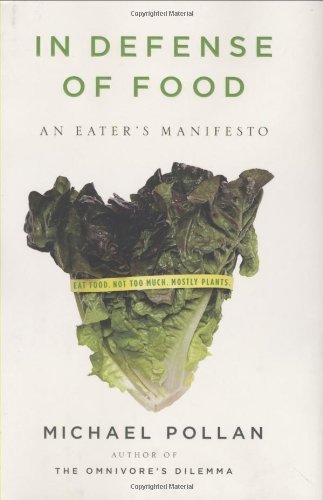Eat, not too much, mostly plans. This is about it.
I always try to remember to take with a pinch of salt American books when it comes to food, but since our countries now are so interconnected now and it is not completely different what we find in our supermarkets, this is a good account of how to make a defense of food.
But from whom it needs defending?
There is a difference between food and food like substances. If you are concern about the your health, we should avoid food with health claims.
We did not grow up eating what our mothers or grandmothers ate growing up. Most of their diet change and would not recognise the food we eat now.
But was happened exactly? Processed food, made by companies that are not looking after our health but rather to maximise profits (using technology and “scientists” to longer store food) and lobbying governments agencies, and using the food marketers, pray on our millennial brain that craves sugar, fat and salt. And we don’t know how to stop.
This and the erosion of a food culture, eating alone, eating fast and eating mindlessly, has created a food problem.
The advise is ever so complicated and the lowest classes struggle to understand, access and benefit the most from this machine.
Eat food, not too much, mostly plants (avoid the Western Diet)
That simple, seven-word phrase captures the essence of this manifesto. Michael Pollan doesn’t give us a new diet trend—he gives us a much-needed reset on how we think about food.
This book is both a sharp critique of modern nutrition culture and a gentle guide back to common sense.
We’re not eating badly because we lack information—we’re eating badly because we’re overwhelmed by noise. Between labels, miracle diets, supplements, and ever-changing advice, we’ve lost the ability to recognize real food and how to eat it in a balanced way. The result: chronic illness, confusion, and a broken relationship with food.
1. The problem isn’t nutrients, it’s “nutritionism”
Pollan introduces the idea of nutritionism—the belief that food is just a sum of nutrients. We focus on fats, carbs, protein, antioxidants… but forget the bigger picture. This reductionist view makes eating about numbers and fear rather than culture and joy.
2. Supermarkets are full of “edible food-like substances”
A lot of what we buy isn’t actually food—it’s heavily processed products engineered to look like food. Low-fat yogurts with artificial sweeteners, cereals with added vitamins, snacks packed with preservatives. Pollan’s advice: the more health claims on a package, the more suspicious you should be.
3. Traditional diets work
There’s no single “perfect” diet, but traditional diets around the world—Mediterranean, Japanese, indigenous—have kept people healthy for centuries. They have one thing in common: real, whole food, cooked and eaten with care, not processed in factories.
4. Eating is a cultural and social act
Pollan reminds us that food is more than fuel. Cooking, sharing meals, and eating together are practices that nourish not just our bodies, but our sense of connection and identity. We’ve traded that richness for convenience and speed.
Food rules worth remembering:
- Eat real food (not products).
- Avoid anything with ingredients you can’t pronounce.
- If your great-grandmother wouldn’t recognize it as food, don’t eat it.
- Shop the outer edges of the supermarket (fresh stuff), not the middle aisles.
- Cook. Even if it’s simple.
- Eat with others.
- Treat meat as a side, not the centerpiece.
